Impact of External Factors and Trends on Marriott International
VerifiedAdded on 2021/01/02
|7
|1978
|73
Report
AI Summary
This report provides a comprehensive analysis of Marriott International within the contemporary hospitality industry. It begins with an introduction to the hospitality sector and focuses on Marriott International, examining the impact of political, economic, social, technological, legislative, and environmental factors on its development. The report includes a SWOT analysis, detailing Marriott's strengths, weaknesses, opportunities, and threats, and discusses how these factors influence decision-making within the company. Furthermore, it explores current and potential trends in the hospitality industry, such as technological advancements and an increased emphasis on health and well-being, and analyzes their implications for Marriott's business strategies. The report concludes by summarizing the key findings and referencing relevant sources.
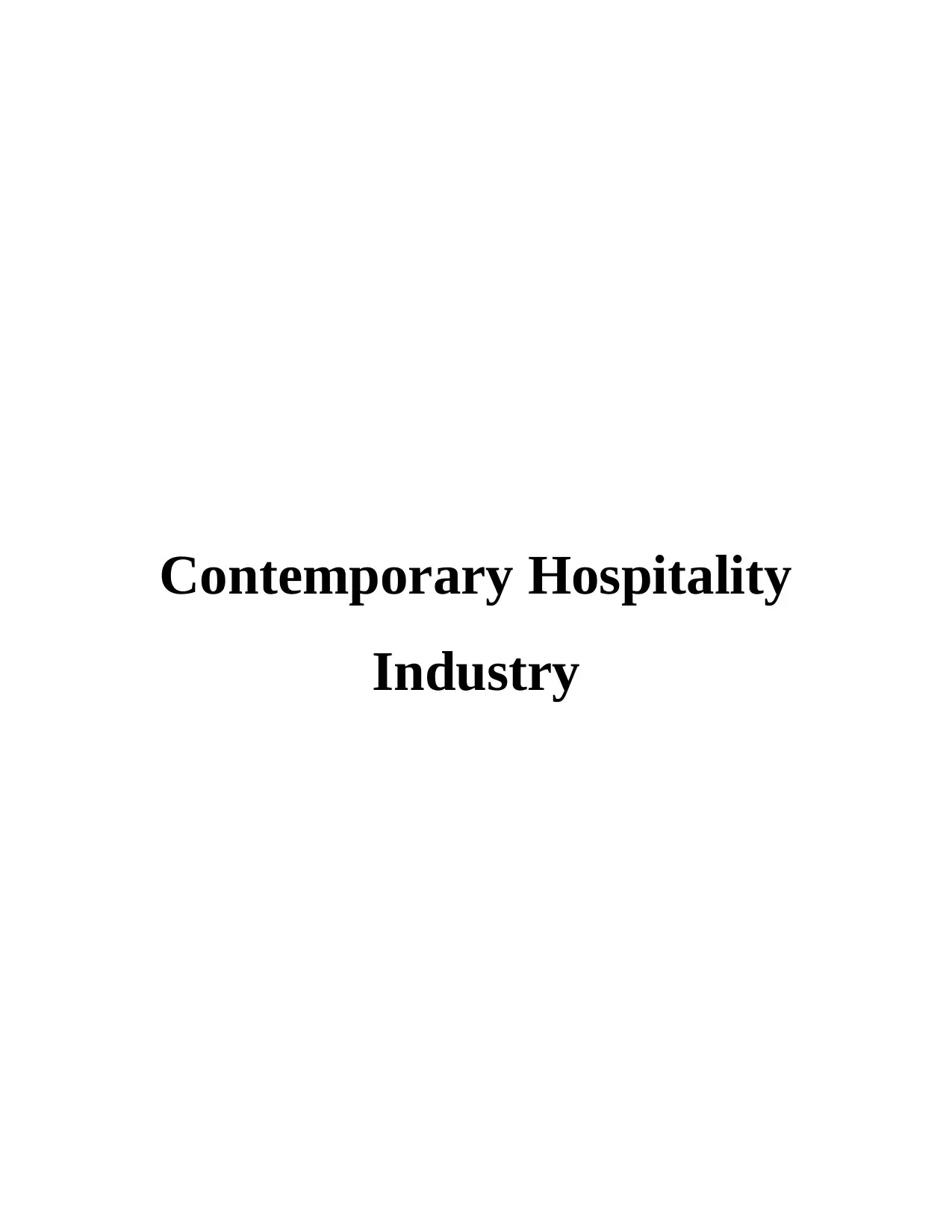
Contemporary Hospitality
Industry
Industry
Paraphrase This Document
Need a fresh take? Get an instant paraphrase of this document with our AI Paraphraser
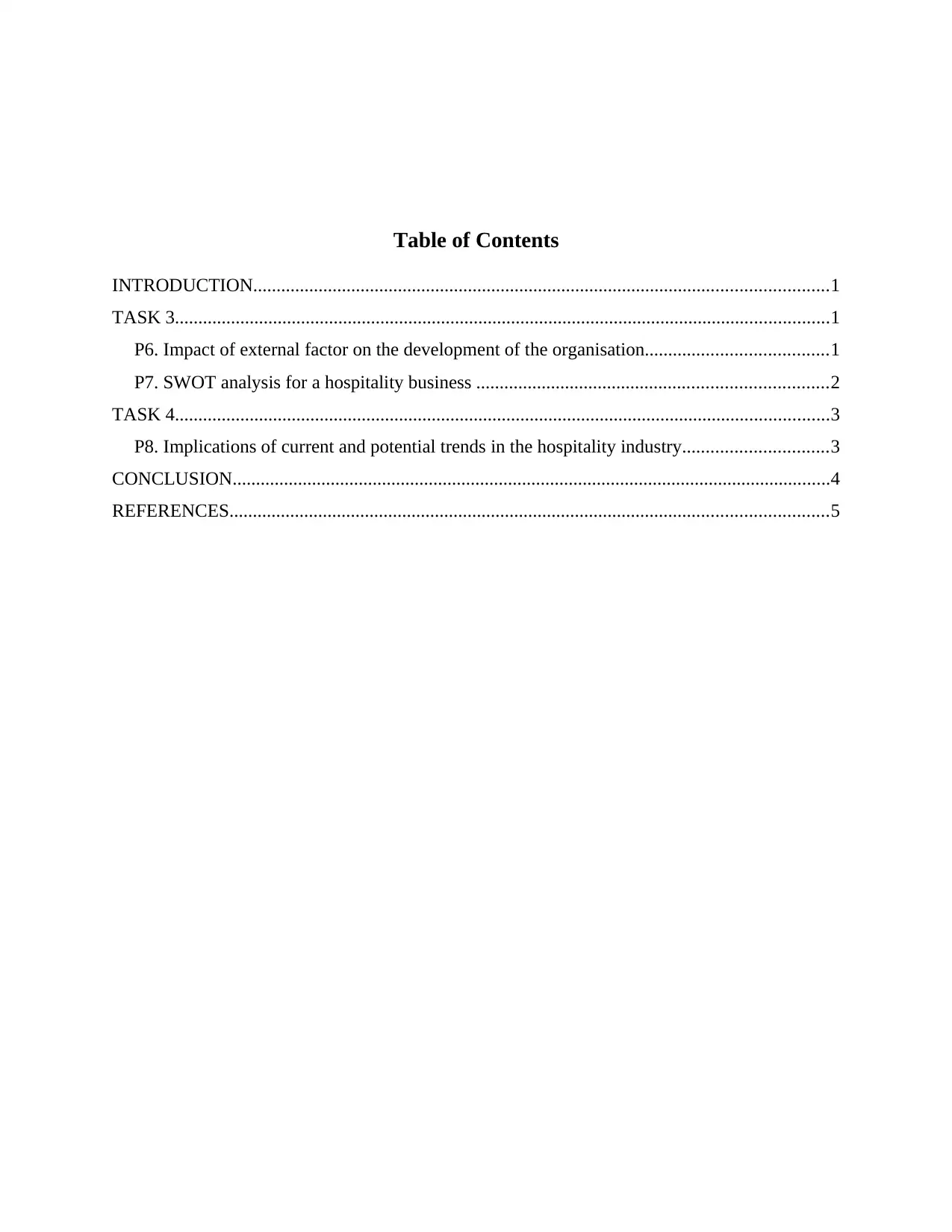
Table of Contents
INTRODUCTION...........................................................................................................................1
TASK 3............................................................................................................................................1
P6. Impact of external factor on the development of the organisation.......................................1
P7. SWOT analysis for a hospitality business ...........................................................................2
TASK 4............................................................................................................................................3
P8. Implications of current and potential trends in the hospitality industry...............................3
CONCLUSION................................................................................................................................4
REFERENCES................................................................................................................................5
INTRODUCTION...........................................................................................................................1
TASK 3............................................................................................................................................1
P6. Impact of external factor on the development of the organisation.......................................1
P7. SWOT analysis for a hospitality business ...........................................................................2
TASK 4............................................................................................................................................3
P8. Implications of current and potential trends in the hospitality industry...............................3
CONCLUSION................................................................................................................................4
REFERENCES................................................................................................................................5
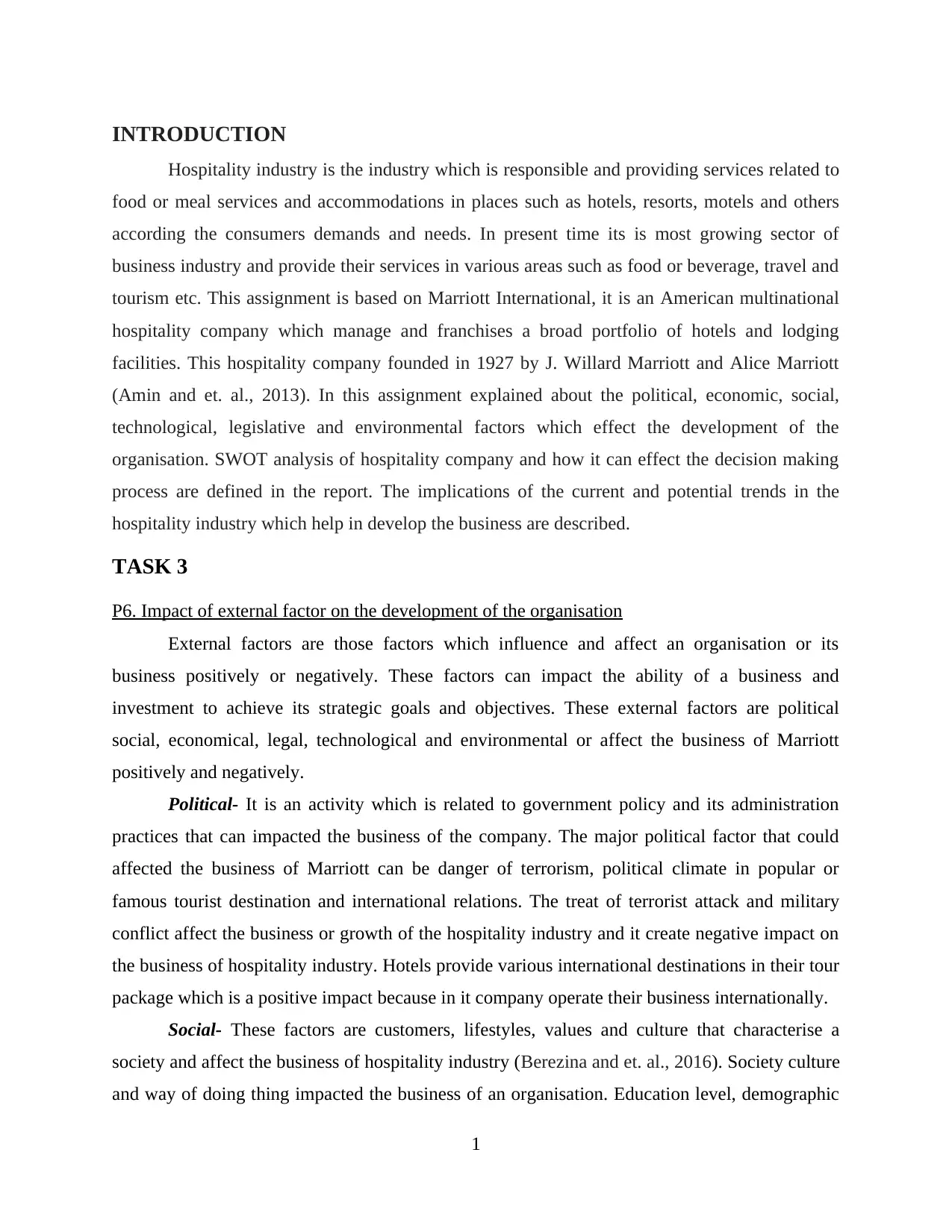
INTRODUCTION
Hospitality industry is the industry which is responsible and providing services related to
food or meal services and accommodations in places such as hotels, resorts, motels and others
according the consumers demands and needs. In present time its is most growing sector of
business industry and provide their services in various areas such as food or beverage, travel and
tourism etc. This assignment is based on Marriott International, it is an American multinational
hospitality company which manage and franchises a broad portfolio of hotels and lodging
facilities. This hospitality company founded in 1927 by J. Willard Marriott and Alice Marriott
(Amin and et. al., 2013). In this assignment explained about the political, economic, social,
technological, legislative and environmental factors which effect the development of the
organisation. SWOT analysis of hospitality company and how it can effect the decision making
process are defined in the report. The implications of the current and potential trends in the
hospitality industry which help in develop the business are described.
TASK 3
P6. Impact of external factor on the development of the organisation
External factors are those factors which influence and affect an organisation or its
business positively or negatively. These factors can impact the ability of a business and
investment to achieve its strategic goals and objectives. These external factors are political
social, economical, legal, technological and environmental or affect the business of Marriott
positively and negatively.
Political- It is an activity which is related to government policy and its administration
practices that can impacted the business of the company. The major political factor that could
affected the business of Marriott can be danger of terrorism, political climate in popular or
famous tourist destination and international relations. The treat of terrorist attack and military
conflict affect the business or growth of the hospitality industry and it create negative impact on
the business of hospitality industry. Hotels provide various international destinations in their tour
package which is a positive impact because in it company operate their business internationally.
Social- These factors are customers, lifestyles, values and culture that characterise a
society and affect the business of hospitality industry (Berezina and et. al., 2016). Society culture
and way of doing thing impacted the business of an organisation. Education level, demographic
1
Hospitality industry is the industry which is responsible and providing services related to
food or meal services and accommodations in places such as hotels, resorts, motels and others
according the consumers demands and needs. In present time its is most growing sector of
business industry and provide their services in various areas such as food or beverage, travel and
tourism etc. This assignment is based on Marriott International, it is an American multinational
hospitality company which manage and franchises a broad portfolio of hotels and lodging
facilities. This hospitality company founded in 1927 by J. Willard Marriott and Alice Marriott
(Amin and et. al., 2013). In this assignment explained about the political, economic, social,
technological, legislative and environmental factors which effect the development of the
organisation. SWOT analysis of hospitality company and how it can effect the decision making
process are defined in the report. The implications of the current and potential trends in the
hospitality industry which help in develop the business are described.
TASK 3
P6. Impact of external factor on the development of the organisation
External factors are those factors which influence and affect an organisation or its
business positively or negatively. These factors can impact the ability of a business and
investment to achieve its strategic goals and objectives. These external factors are political
social, economical, legal, technological and environmental or affect the business of Marriott
positively and negatively.
Political- It is an activity which is related to government policy and its administration
practices that can impacted the business of the company. The major political factor that could
affected the business of Marriott can be danger of terrorism, political climate in popular or
famous tourist destination and international relations. The treat of terrorist attack and military
conflict affect the business or growth of the hospitality industry and it create negative impact on
the business of hospitality industry. Hotels provide various international destinations in their tour
package which is a positive impact because in it company operate their business internationally.
Social- These factors are customers, lifestyles, values and culture that characterise a
society and affect the business of hospitality industry (Berezina and et. al., 2016). Society culture
and way of doing thing impacted the business of an organisation. Education level, demographic
1
⊘ This is a preview!⊘
Do you want full access?
Subscribe today to unlock all pages.

Trusted by 1+ million students worldwide
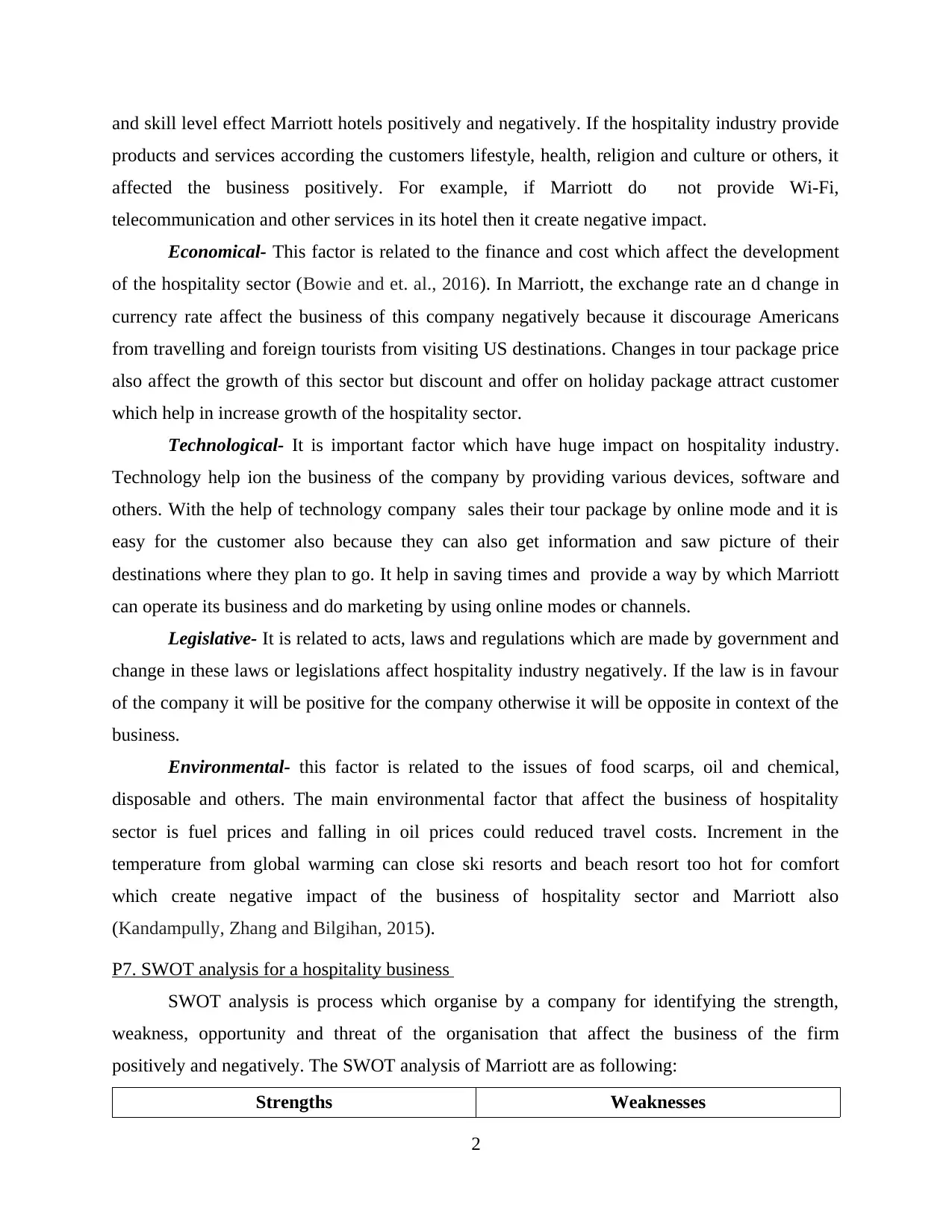
and skill level effect Marriott hotels positively and negatively. If the hospitality industry provide
products and services according the customers lifestyle, health, religion and culture or others, it
affected the business positively. For example, if Marriott do not provide Wi-Fi,
telecommunication and other services in its hotel then it create negative impact.
Economical- This factor is related to the finance and cost which affect the development
of the hospitality sector (Bowie and et. al., 2016). In Marriott, the exchange rate an d change in
currency rate affect the business of this company negatively because it discourage Americans
from travelling and foreign tourists from visiting US destinations. Changes in tour package price
also affect the growth of this sector but discount and offer on holiday package attract customer
which help in increase growth of the hospitality sector.
Technological- It is important factor which have huge impact on hospitality industry.
Technology help ion the business of the company by providing various devices, software and
others. With the help of technology company sales their tour package by online mode and it is
easy for the customer also because they can also get information and saw picture of their
destinations where they plan to go. It help in saving times and provide a way by which Marriott
can operate its business and do marketing by using online modes or channels.
Legislative- It is related to acts, laws and regulations which are made by government and
change in these laws or legislations affect hospitality industry negatively. If the law is in favour
of the company it will be positive for the company otherwise it will be opposite in context of the
business.
Environmental- this factor is related to the issues of food scarps, oil and chemical,
disposable and others. The main environmental factor that affect the business of hospitality
sector is fuel prices and falling in oil prices could reduced travel costs. Increment in the
temperature from global warming can close ski resorts and beach resort too hot for comfort
which create negative impact of the business of hospitality sector and Marriott also
(Kandampully, Zhang and Bilgihan, 2015).
P7. SWOT analysis for a hospitality business
SWOT analysis is process which organise by a company for identifying the strength,
weakness, opportunity and threat of the organisation that affect the business of the firm
positively and negatively. The SWOT analysis of Marriott are as following:
Strengths Weaknesses
2
products and services according the customers lifestyle, health, religion and culture or others, it
affected the business positively. For example, if Marriott do not provide Wi-Fi,
telecommunication and other services in its hotel then it create negative impact.
Economical- This factor is related to the finance and cost which affect the development
of the hospitality sector (Bowie and et. al., 2016). In Marriott, the exchange rate an d change in
currency rate affect the business of this company negatively because it discourage Americans
from travelling and foreign tourists from visiting US destinations. Changes in tour package price
also affect the growth of this sector but discount and offer on holiday package attract customer
which help in increase growth of the hospitality sector.
Technological- It is important factor which have huge impact on hospitality industry.
Technology help ion the business of the company by providing various devices, software and
others. With the help of technology company sales their tour package by online mode and it is
easy for the customer also because they can also get information and saw picture of their
destinations where they plan to go. It help in saving times and provide a way by which Marriott
can operate its business and do marketing by using online modes or channels.
Legislative- It is related to acts, laws and regulations which are made by government and
change in these laws or legislations affect hospitality industry negatively. If the law is in favour
of the company it will be positive for the company otherwise it will be opposite in context of the
business.
Environmental- this factor is related to the issues of food scarps, oil and chemical,
disposable and others. The main environmental factor that affect the business of hospitality
sector is fuel prices and falling in oil prices could reduced travel costs. Increment in the
temperature from global warming can close ski resorts and beach resort too hot for comfort
which create negative impact of the business of hospitality sector and Marriott also
(Kandampully, Zhang and Bilgihan, 2015).
P7. SWOT analysis for a hospitality business
SWOT analysis is process which organise by a company for identifying the strength,
weakness, opportunity and threat of the organisation that affect the business of the firm
positively and negatively. The SWOT analysis of Marriott are as following:
Strengths Weaknesses
2
Paraphrase This Document
Need a fresh take? Get an instant paraphrase of this document with our AI Paraphraser
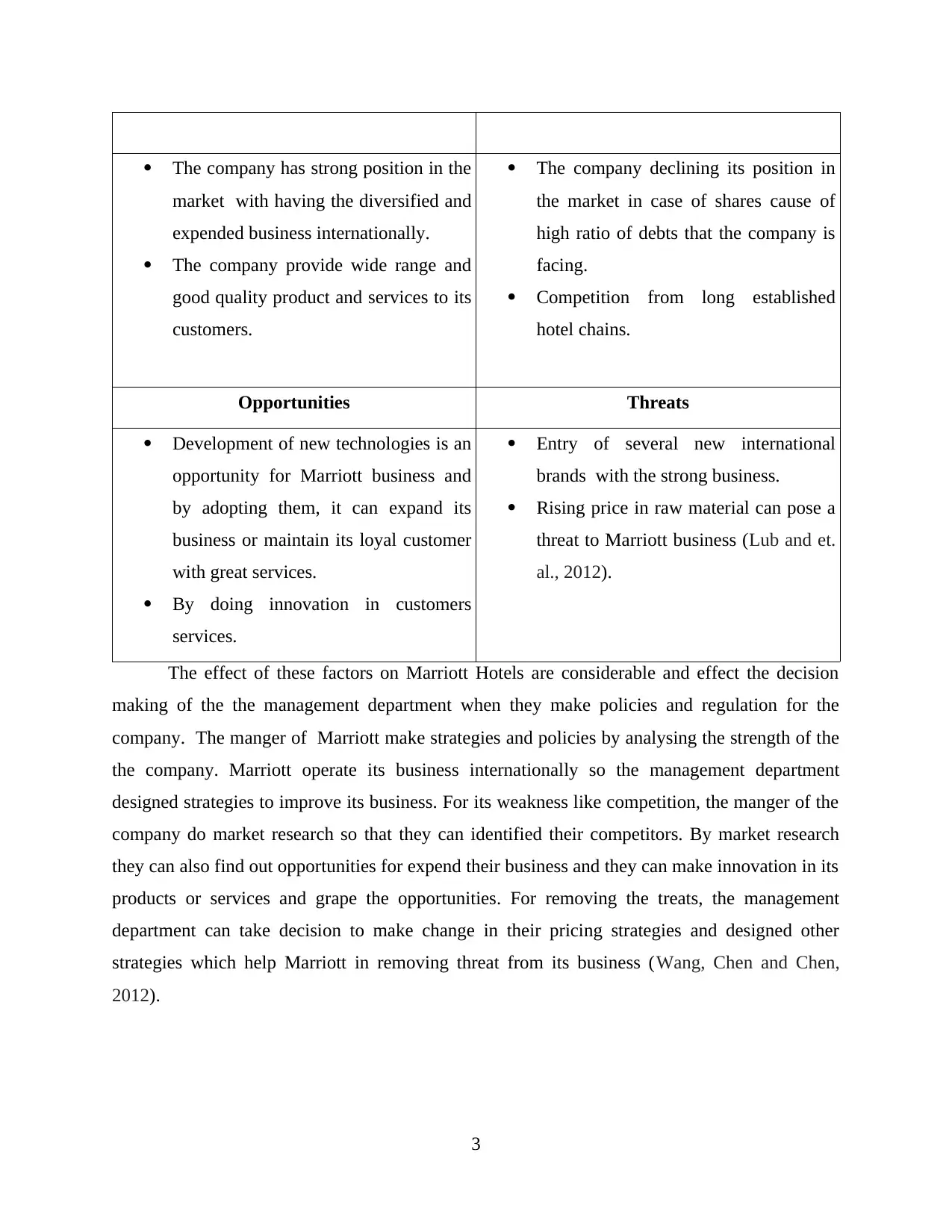
The company has strong position in the
market with having the diversified and
expended business internationally.
The company provide wide range and
good quality product and services to its
customers.
The company declining its position in
the market in case of shares cause of
high ratio of debts that the company is
facing.
Competition from long established
hotel chains.
Opportunities Threats
Development of new technologies is an
opportunity for Marriott business and
by adopting them, it can expand its
business or maintain its loyal customer
with great services.
By doing innovation in customers
services.
Entry of several new international
brands with the strong business.
Rising price in raw material can pose a
threat to Marriott business (Lub and et.
al., 2012).
The effect of these factors on Marriott Hotels are considerable and effect the decision
making of the the management department when they make policies and regulation for the
company. The manger of Marriott make strategies and policies by analysing the strength of the
the company. Marriott operate its business internationally so the management department
designed strategies to improve its business. For its weakness like competition, the manger of the
company do market research so that they can identified their competitors. By market research
they can also find out opportunities for expend their business and they can make innovation in its
products or services and grape the opportunities. For removing the treats, the management
department can take decision to make change in their pricing strategies and designed other
strategies which help Marriott in removing threat from its business (Wang, Chen and Chen,
2012).
3
market with having the diversified and
expended business internationally.
The company provide wide range and
good quality product and services to its
customers.
The company declining its position in
the market in case of shares cause of
high ratio of debts that the company is
facing.
Competition from long established
hotel chains.
Opportunities Threats
Development of new technologies is an
opportunity for Marriott business and
by adopting them, it can expand its
business or maintain its loyal customer
with great services.
By doing innovation in customers
services.
Entry of several new international
brands with the strong business.
Rising price in raw material can pose a
threat to Marriott business (Lub and et.
al., 2012).
The effect of these factors on Marriott Hotels are considerable and effect the decision
making of the the management department when they make policies and regulation for the
company. The manger of Marriott make strategies and policies by analysing the strength of the
the company. Marriott operate its business internationally so the management department
designed strategies to improve its business. For its weakness like competition, the manger of the
company do market research so that they can identified their competitors. By market research
they can also find out opportunities for expend their business and they can make innovation in its
products or services and grape the opportunities. For removing the treats, the management
department can take decision to make change in their pricing strategies and designed other
strategies which help Marriott in removing threat from its business (Wang, Chen and Chen,
2012).
3
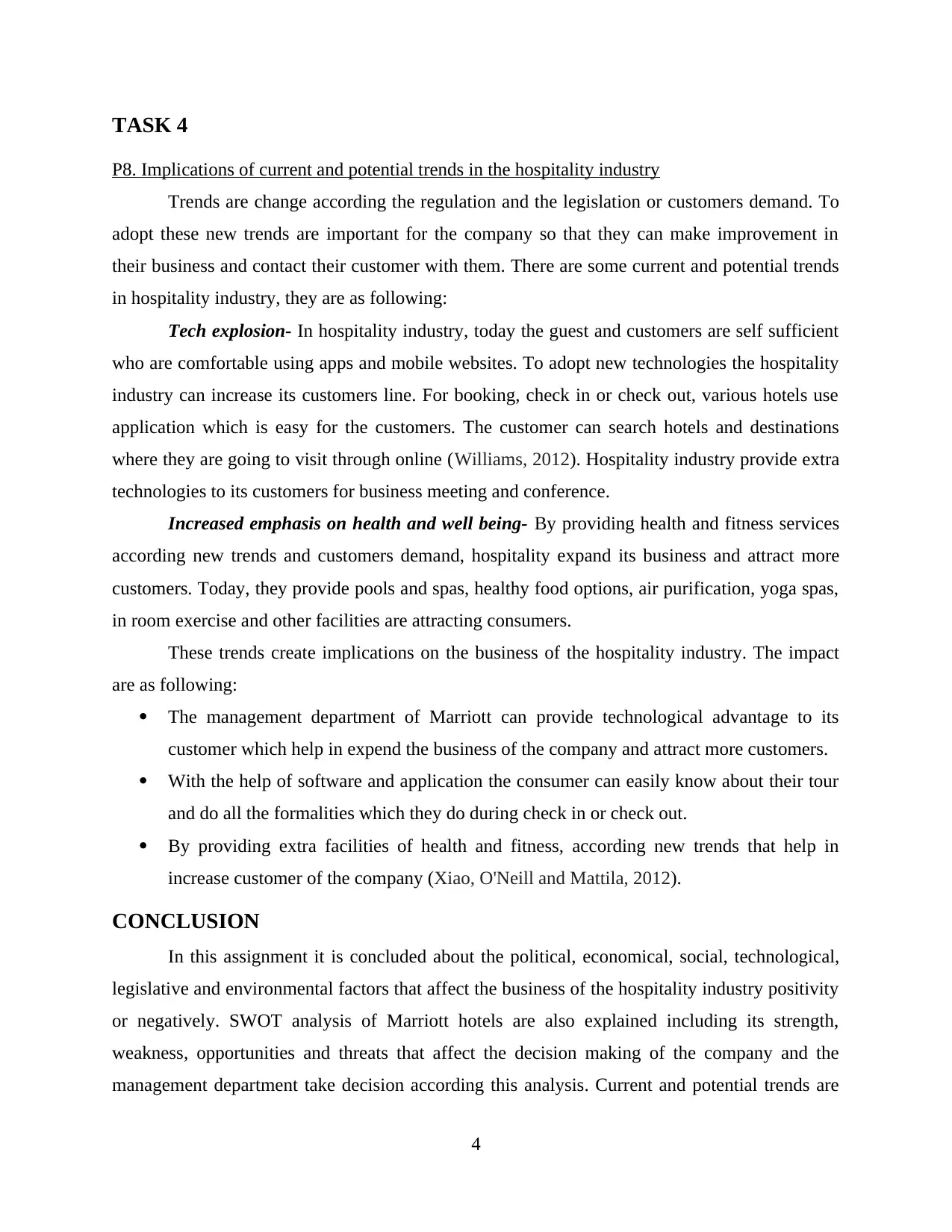
TASK 4
P8. Implications of current and potential trends in the hospitality industry
Trends are change according the regulation and the legislation or customers demand. To
adopt these new trends are important for the company so that they can make improvement in
their business and contact their customer with them. There are some current and potential trends
in hospitality industry, they are as following:
Tech explosion- In hospitality industry, today the guest and customers are self sufficient
who are comfortable using apps and mobile websites. To adopt new technologies the hospitality
industry can increase its customers line. For booking, check in or check out, various hotels use
application which is easy for the customers. The customer can search hotels and destinations
where they are going to visit through online (Williams, 2012). Hospitality industry provide extra
technologies to its customers for business meeting and conference.
Increased emphasis on health and well being- By providing health and fitness services
according new trends and customers demand, hospitality expand its business and attract more
customers. Today, they provide pools and spas, healthy food options, air purification, yoga spas,
in room exercise and other facilities are attracting consumers.
These trends create implications on the business of the hospitality industry. The impact
are as following:
The management department of Marriott can provide technological advantage to its
customer which help in expend the business of the company and attract more customers.
With the help of software and application the consumer can easily know about their tour
and do all the formalities which they do during check in or check out.
By providing extra facilities of health and fitness, according new trends that help in
increase customer of the company (Xiao, O'Neill and Mattila, 2012).
CONCLUSION
In this assignment it is concluded about the political, economical, social, technological,
legislative and environmental factors that affect the business of the hospitality industry positivity
or negatively. SWOT analysis of Marriott hotels are also explained including its strength,
weakness, opportunities and threats that affect the decision making of the company and the
management department take decision according this analysis. Current and potential trends are
4
P8. Implications of current and potential trends in the hospitality industry
Trends are change according the regulation and the legislation or customers demand. To
adopt these new trends are important for the company so that they can make improvement in
their business and contact their customer with them. There are some current and potential trends
in hospitality industry, they are as following:
Tech explosion- In hospitality industry, today the guest and customers are self sufficient
who are comfortable using apps and mobile websites. To adopt new technologies the hospitality
industry can increase its customers line. For booking, check in or check out, various hotels use
application which is easy for the customers. The customer can search hotels and destinations
where they are going to visit through online (Williams, 2012). Hospitality industry provide extra
technologies to its customers for business meeting and conference.
Increased emphasis on health and well being- By providing health and fitness services
according new trends and customers demand, hospitality expand its business and attract more
customers. Today, they provide pools and spas, healthy food options, air purification, yoga spas,
in room exercise and other facilities are attracting consumers.
These trends create implications on the business of the hospitality industry. The impact
are as following:
The management department of Marriott can provide technological advantage to its
customer which help in expend the business of the company and attract more customers.
With the help of software and application the consumer can easily know about their tour
and do all the formalities which they do during check in or check out.
By providing extra facilities of health and fitness, according new trends that help in
increase customer of the company (Xiao, O'Neill and Mattila, 2012).
CONCLUSION
In this assignment it is concluded about the political, economical, social, technological,
legislative and environmental factors that affect the business of the hospitality industry positivity
or negatively. SWOT analysis of Marriott hotels are also explained including its strength,
weakness, opportunities and threats that affect the decision making of the company and the
management department take decision according this analysis. Current and potential trends are
4
⊘ This is a preview!⊘
Do you want full access?
Subscribe today to unlock all pages.

Trusted by 1+ million students worldwide
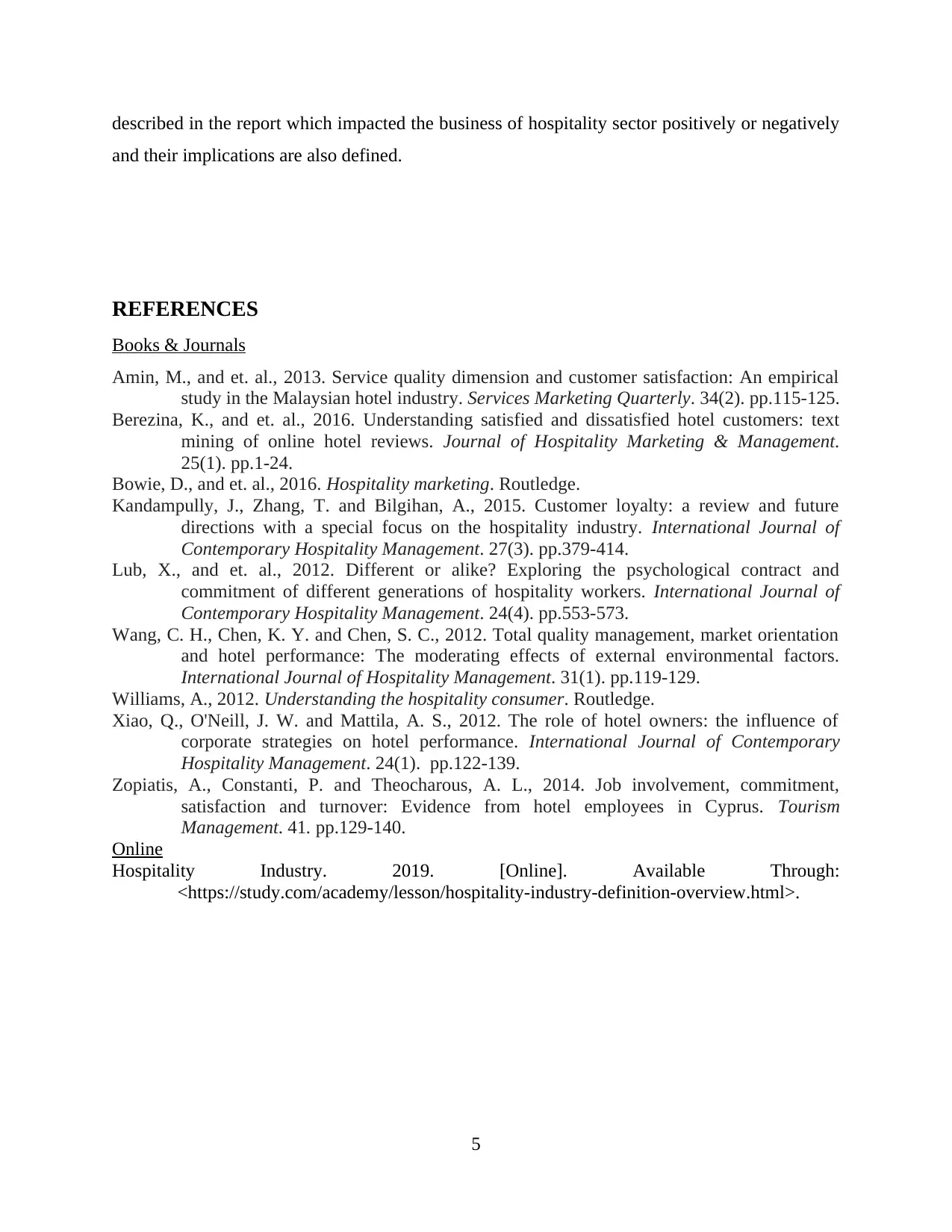
described in the report which impacted the business of hospitality sector positively or negatively
and their implications are also defined.
REFERENCES
Books & Journals
Amin, M., and et. al., 2013. Service quality dimension and customer satisfaction: An empirical
study in the Malaysian hotel industry. Services Marketing Quarterly. 34(2). pp.115-125.
Berezina, K., and et. al., 2016. Understanding satisfied and dissatisfied hotel customers: text
mining of online hotel reviews. Journal of Hospitality Marketing & Management.
25(1). pp.1-24.
Bowie, D., and et. al., 2016. Hospitality marketing. Routledge.
Kandampully, J., Zhang, T. and Bilgihan, A., 2015. Customer loyalty: a review and future
directions with a special focus on the hospitality industry. International Journal of
Contemporary Hospitality Management. 27(3). pp.379-414.
Lub, X., and et. al., 2012. Different or alike? Exploring the psychological contract and
commitment of different generations of hospitality workers. International Journal of
Contemporary Hospitality Management. 24(4). pp.553-573.
Wang, C. H., Chen, K. Y. and Chen, S. C., 2012. Total quality management, market orientation
and hotel performance: The moderating effects of external environmental factors.
International Journal of Hospitality Management. 31(1). pp.119-129.
Williams, A., 2012. Understanding the hospitality consumer. Routledge.
Xiao, Q., O'Neill, J. W. and Mattila, A. S., 2012. The role of hotel owners: the influence of
corporate strategies on hotel performance. International Journal of Contemporary
Hospitality Management. 24(1). pp.122-139.
Zopiatis, A., Constanti, P. and Theocharous, A. L., 2014. Job involvement, commitment,
satisfaction and turnover: Evidence from hotel employees in Cyprus. Tourism
Management. 41. pp.129-140.
Online
Hospitality Industry. 2019. [Online]. Available Through:
<https://study.com/academy/lesson/hospitality-industry-definition-overview.html>.
5
and their implications are also defined.
REFERENCES
Books & Journals
Amin, M., and et. al., 2013. Service quality dimension and customer satisfaction: An empirical
study in the Malaysian hotel industry. Services Marketing Quarterly. 34(2). pp.115-125.
Berezina, K., and et. al., 2016. Understanding satisfied and dissatisfied hotel customers: text
mining of online hotel reviews. Journal of Hospitality Marketing & Management.
25(1). pp.1-24.
Bowie, D., and et. al., 2016. Hospitality marketing. Routledge.
Kandampully, J., Zhang, T. and Bilgihan, A., 2015. Customer loyalty: a review and future
directions with a special focus on the hospitality industry. International Journal of
Contemporary Hospitality Management. 27(3). pp.379-414.
Lub, X., and et. al., 2012. Different or alike? Exploring the psychological contract and
commitment of different generations of hospitality workers. International Journal of
Contemporary Hospitality Management. 24(4). pp.553-573.
Wang, C. H., Chen, K. Y. and Chen, S. C., 2012. Total quality management, market orientation
and hotel performance: The moderating effects of external environmental factors.
International Journal of Hospitality Management. 31(1). pp.119-129.
Williams, A., 2012. Understanding the hospitality consumer. Routledge.
Xiao, Q., O'Neill, J. W. and Mattila, A. S., 2012. The role of hotel owners: the influence of
corporate strategies on hotel performance. International Journal of Contemporary
Hospitality Management. 24(1). pp.122-139.
Zopiatis, A., Constanti, P. and Theocharous, A. L., 2014. Job involvement, commitment,
satisfaction and turnover: Evidence from hotel employees in Cyprus. Tourism
Management. 41. pp.129-140.
Online
Hospitality Industry. 2019. [Online]. Available Through:
<https://study.com/academy/lesson/hospitality-industry-definition-overview.html>.
5
1 out of 7
Related Documents
Your All-in-One AI-Powered Toolkit for Academic Success.
+13062052269
info@desklib.com
Available 24*7 on WhatsApp / Email
![[object Object]](/_next/static/media/star-bottom.7253800d.svg)
Unlock your academic potential
Copyright © 2020–2026 A2Z Services. All Rights Reserved. Developed and managed by ZUCOL.





